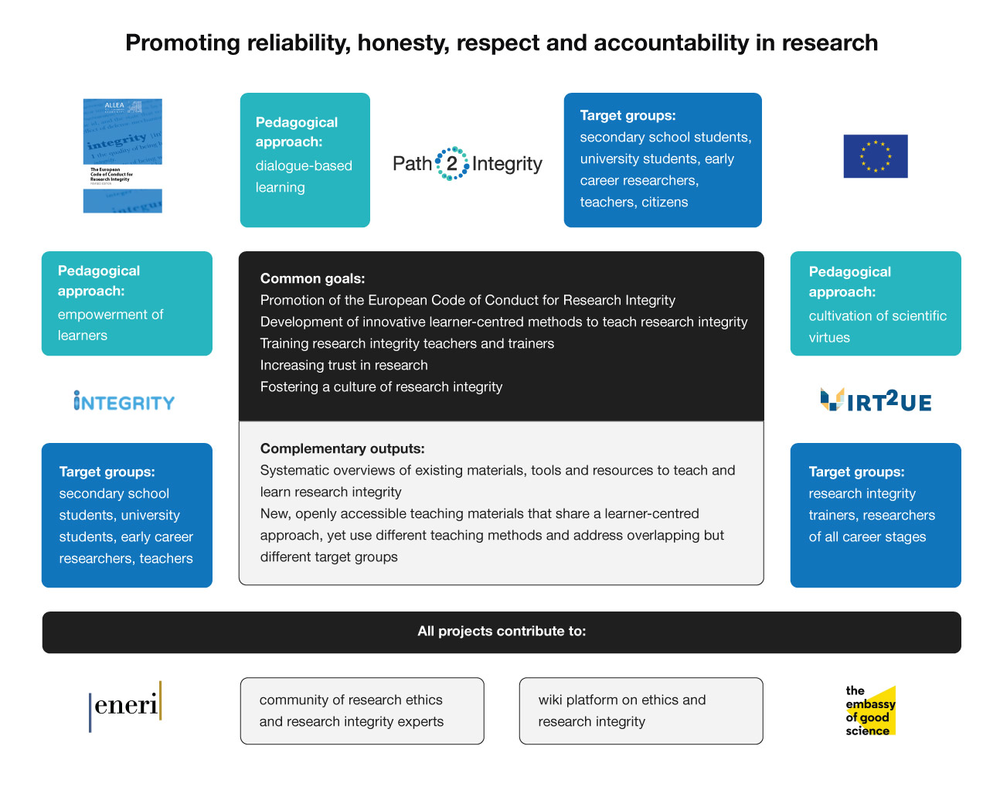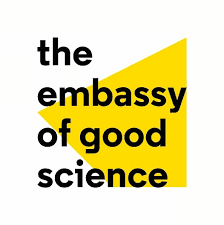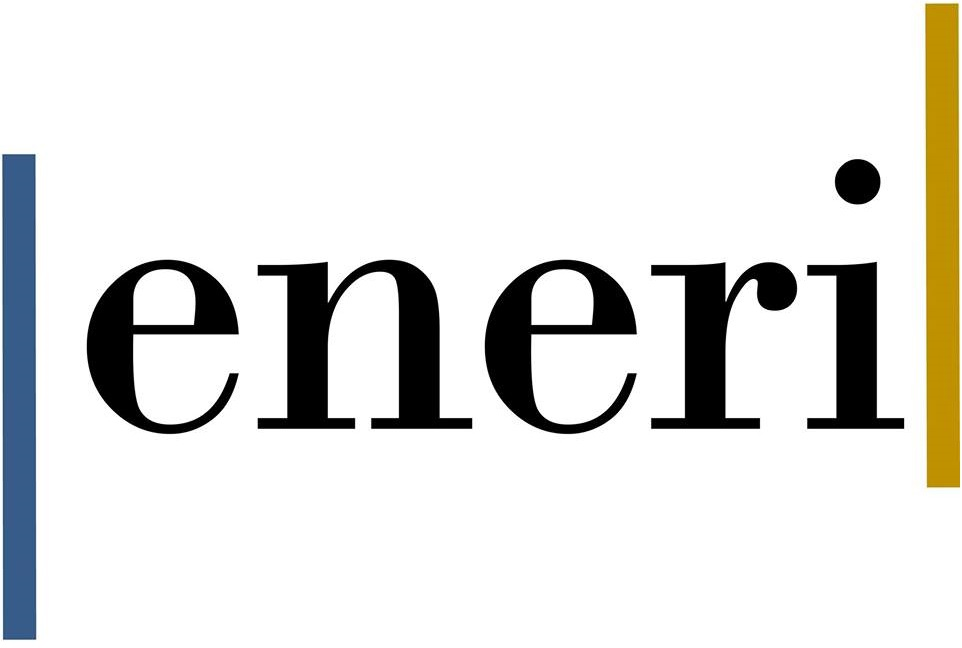Path2Integrity, INTEGRITY and VIRT2UE, three projects funded by the European Commission’s Horizon 2020 Science with and for Society programme, develop educational materials, tools and resources to foster a culture of research integrity in and beyond Europe that shall increase public trust in research and promote good scientific practice among students and researchers of various ages and career stages. All three projects share the goal of supporting a widespread adaptation of the European Code of Conduct for Research Integrity and an internalisation of its values and principles.
The projects have formed a cluster to realise synergies, create opportunities for mutual learning and sharpen their distinctions. As fostering a culture of research integrity via education is complex, the cluster starts from the assumption that it is necessary to use multiple pedagogical approaches and methodologies and to also address hitherto neglected yet critically important target groups. Research integrity education should be a subject of lifelong learning for everyone interested or involved in research.
The overview of the cluster presented below highlights how the three projects relate to each other and how they interact with the European Network of Research Ethics and Research Integrity (ENERI) and The Embassy of Good Science, two important networks in responsible conduct of research. The overview helps everyone interested in promoting good scientific practice to better navigate the landscape of research integrity education in Europe. It facilitates a clearer understanding of where the projects overlap, how they differ and what their unique characteristics are. In particular, the overview shows the specific pedagogical approach taken by each project, their respective target groups and their common objectives.



Path2Integrity develops formal and informal learning paths to educate secondary school students, university students, early career researchers and citizens about research integrity based on the European Code of Conduct for Research Integrity. On its formal learning path, the project develops learning cards that outline teaching units on various aspects of research integrity, each of which takes a dialogical approach to learning and lasts between 90 and 120 minutes. All learning cards make either use of rotatory role-play or vivid storytelling to engage learners. The learning cards will form the core of a handbook of instructions and be accompanied by a train-the-trainer programme. On its informal learning path, Path2Integrity launches an awareness raising campaign at various educational institutions across Europe, focusing mainly on secondary schools and universities.
Throughout the duration of the project, all learning materials as well as the train-the-trainer programme will be rigorously evaluated and improved in light of the resulting evidence. A training centre and a community of teachers will secure the sustainability of the project, workshops in Canada, Mexico, Zambia and Taiwan will increase its international visibility.
Duration: January 2019 – December 2021
Coordinator: Prof. Dr. Julia Prieß-Buchheit, Coburg University


INTEGRITY aims to build capacities of secondary school students, undergraduate students and early career researchers to conduct research responsibly in an empowering way. Underlying assumption of the project is that empowerment will help (future) researchers to detect, reflect and deal with issues that they encounter in their own research practice. The project develops innovative, engaging educational tools for the three target groups in an evidence-based manner and in co-creation with students in a variety of disciplines. INTEGRITY combines high quality training in ethics and research integrity with innovative modes of engagement, thus equipping the next generation of researchers with the capacity to conduct research responsibly and address unforeseen challenges with integrity and in an ethical manner.
A unique feature of INTEGRITY is its focus on empowerment, incorporating a positive attitude towards training in responsible conduct of research, namely by focusing on how to do good research. Consequently, capacity building of students is at the centre of the teaching philosophy that underpins the project. This teaching philosophy, taking transparency, honesty and responsibility as core principles into account, will be developed into a competence profile.
Duration: January 2019 – December 2021
Coordinator: Dr. Mariëtte van den Hoven, University of Utrecht


VIRT2UE has developed a blended-learning train-the-trainer programme for research integrity trainers that aims to foster scientific virtues and the consistent application of the European Code of Conduct for Research Integrity across Europe via online and face-to-face training. The major target group of the project are research integrity trainers and researchers. Methodologically the programme is based on a virtue ethical approach to research integrity, while its pedagogical principles are learner-centredness, constructive alignment and evidence-based methods. The train-the-trainer programme draws on a systematic mapping of scientific virtues and educational resources conducted by the project.
The virtue ethical approach focuses on building scientific virtues that allow researchers to act with integrity and apply the content of the European Code of Conduct for Research Integrity in concrete situations. VIRT2UE seeks to enable researchers to master challenges they are likely to encounter over the course of their academic career. The programme rests on the premise that effective research integrity training should not only convey knowledge of codes and regulations but must also address moral character building. In addition to the train-the-trainer programme, VIRT2UE develops online learning materials, including massive open online courses (MOOCS) and videos. Overall, the project develops a flexible toolbox of resources that enables research integrity trainers to teach learner-centred courses in different institutional and cultural settings.
Duration: June 2018 – May 2020
Coordinator: Prof. Dr. Guy Widdershoven, VUmc Amsterdam


The Embassy of Good Science, developed jointly by the projects EnTIRE and VIRT2UE, is a wiki-platform where the community of researchers and all those involved in research can share experiences and insights on research integrity. The platform is conceptualised as a hub to which anyone willing to learn or support others in fostering understanding and awareness around good science can contribute. Focusing on researchers’ daily practices, the Embassy covers a wide variety of themes in an easy-to-read, user-friendly manner, maps the laws, policies and guidelines informing good practices and highlights relevant cases, experiences, educational materials and good practice examples.
VIRT2UE forms the Embassy’s educational pillar and ensures that the platform supports educators to develop training on research integrity. Path2Integrity and INTEGRITY will publish some of their outputs on the platform and thereby help anchoring it in the research community.


ENERI is the European Network of Research Ethics and Research Integrity, a platform that aims to improve and institutionalise the exchange between experts in the fields of research ethics and research integrity. ENERI has established an e-Community to foster smooth communication and cooperation among its members, which anyone interested in supporting research ethics and research integrity is invited to join. The research integrity education projects may use the community to disseminate outputs, create sustainability and draw inspiration from the online training options available in the ENERI classroom.
Furthermore, ENERI has developed recommendations and tools for researchers, research ethics committees and research integrity offices: a research integrity handbook outlining how cases of suspected misconduct may be investigated, a research ethics and research integrity manual, and a decision tree that helps researchers to think about ethical questions and challenges during a research project. All these resources may be of interest also to educators who want to learn more about research integrity.





